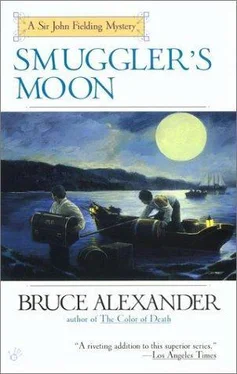Bruce Alexander - Smuggler's Moon
Здесь есть возможность читать онлайн «Bruce Alexander - Smuggler's Moon» весь текст электронной книги совершенно бесплатно (целиком полную версию без сокращений). В некоторых случаях можно слушать аудио, скачать через торрент в формате fb2 и присутствует краткое содержание. Жанр: Исторический детектив, на английском языке. Описание произведения, (предисловие) а так же отзывы посетителей доступны на портале библиотеки ЛибКат.
- Название:Smuggler's Moon
- Автор:
- Жанр:
- Год:неизвестен
- ISBN:нет данных
- Рейтинг книги:4 / 5. Голосов: 1
-
Избранное:Добавить в избранное
- Отзывы:
-
Ваша оценка:
- 80
- 1
- 2
- 3
- 4
- 5
Smuggler's Moon: краткое содержание, описание и аннотация
Предлагаем к чтению аннотацию, описание, краткое содержание или предисловие (зависит от того, что написал сам автор книги «Smuggler's Moon»). Если вы не нашли необходимую информацию о книге — напишите в комментариях, мы постараемся отыскать её.
Smuggler's Moon — читать онлайн бесплатно полную книгу (весь текст) целиком
Ниже представлен текст книги, разбитый по страницам. Система сохранения места последней прочитанной страницы, позволяет с удобством читать онлайн бесплатно книгу «Smuggler's Moon», без необходимости каждый раз заново искать на чём Вы остановились. Поставьте закладку, и сможете в любой момент перейти на страницу, на которой закончили чтение.
Интервал:
Закладка:
The few who had remained round the grave were now gathered in close to hear the two men talk. One could divine from whispers and unspoken responses that those who listened disapproved of Sir Simon’s remarks and thought them particularly ill-considered at such a time and in such a place, as indeed they were.
“How can you not, sir? He did naught but offend the local populace-or at least those who mattered. And as for the smuggling hereabouts, he encouraged it by his inactivity. No, Deal is far better off without him.”
“If that is your feeling, Sir Simon, may I ask why in the world you bothered to attend this funeral service?”
He fluttered a hand, dismissing the question. ”Oh, in my position, I must attend a good many ceremonies which I should prefer not to attend. For appearances’ sake, you understand.”
“Oh, indeed I do.”
“I’ve no idea who will take Sarton’s place-a local man, no doubt. For a time we shall be without a magistrate, and I venture that none will notice.”
By this time the grumbling from the listeners had grown ominous. Sir Simon, however, seemed to take no notice. He wore his indifference as a shield.
“I believe,” said Sir John, ”that I have a surprise for you, sir. Deal is not without a magistrate, nor is it likely to be.”
Sir Simon’s eyes narrowed. He stepped back and regarded Sir John in a suspicious, even hostile manner. Though he knew not what this blind fellow had in store, he seemed sure that it betokened little good for him. ”What do you mean?” he asked at last.
“Why, I mean, sir, that I am the magistrate of Deal for such time as it may take to set things aright.”
“ You? What do you mean by that? On whose authority?”
Sir Simon was thrown into such disarray by Sir John’s announcement that the shock he felt was written plain upon his face. Laughter was barely suppressed by those who had remained to listen; it emerged in snorts and giggles, which seemed to anger Sir Simon greatly. He looked about him as if ready to demand silence from all. Yet no such order came, for when Sir John cleared his throat and made to speak, all fell quiet.
“I meant by that, sir, just what I said. I am, by the order of your old friend, Lord Mansfield, given temporary powers as magistrate of the town of Deal and surrounding territories and waters. And as for setting things aright, that is precisely what I intend to do. I intend to discover the murderer of Albert Sarton and bring him to justice. Further, I hope to deal a killing blow to the smuggling trade, if only here in Deal. My authorization and empowerment in this is set out in a letter from the Lord Chief Justice. You may see the letter, if you care to, any time you drop by the magistrate’s residence. Now, is there any part of that you would have me explain further?”
“No.” Sir Simon appeared so taken aback by the speech from the heretofore nearly silent Sir John that that single syllable was all that he could manage.
”And if I may, sir,” Sir John added, ”I should like to introduce you to three of my Bow Street Runners-constables Bailey, Patley, and Perkins.” And so saying, he waved a hand in the precise direction where the three stood together beneath a great elm tree. ”They have come down from London at my invitation. Do make it clear, sir, to your servants and those who work for you, that these men speak for me in all matters to do with the law.”
He bobbed his head, and at the same time touched his hat in a farewell salute. ”Now if you will pardon us, Sir Simon, we shall take our leave of you. A good day to you, sir.”
For the rest of the day and for all of the next, the Sarton house was humming with the making of plans and preparations. To what end was kept secret from me, though I was fair certain that it was Sir John’s intention to strike that ”killing blow to the smuggling trade” of which he had spoken to Sir Simon Grenville.
Endless conferences with the Runners who had come down from London were conducted behind closed doors. Another visit by that slippery individual, Dick Dickens, took place late at night and lasted well past midnight. And I was altogether astonished when, next morning, I was sent off to the heart of town to find Mick Crawly, the driver of the hackney coach.
“Find him?” said I. ”What then?”
“Why, fetch him,” said Sir John. ”Tell him I wish to speak with him.”
I started to go, but then did I stop and turn about, thinking that I might save a bit of time and trouble for myself and for Sir John.
“Perhaps I could take a message to him,” I suggested. ”If you wish to travel with him somewhere, just tell me where that might be and when you wish to depart. I shall tell him, and he will be here. He is, in that way, quite dependable.”
“Jeremy, please, just fetch the fellow. The matter between us may take some discussion. It is not the sort of thing that may be handled with a message and a simple reply. Be a good lad, and do as I ask.”
Yet still I hesitated. ”What if he asks what it is you wish to discuss with him?”
“Then tell him he will learn that when he comes. Get on with you now. Do as I say.”
And so, having little or no choice in the matter, I left forthwith for Broad Street I knew the way quite well. Indeed, in the space of time we had been in Deal, I had learned the shape of the town so well that I could have drawn a map of its center and erred little more than in a detail or two. Yet, of the surrounding region I knew very little.
Even less did I know of the plan-or plans-that Sir John had made to trap the smugglers and put an end to the smuggling trade in Deal. In spite of hints I had dropped to the three London constables, I was coolly ignored. At the time, that did seem to me to be most cruel-particularly in that I counted two of the three among my close friends. And now it seemed that even one of the local hackney coach drivers was to know better than I just what was afoot. What was one to do?
I was to do naught but what I was told, apparently.
And so did I make my way along High Street in the direction of Broad Street-Broad Street, where the hackney coaches gathered in line to serve the travelers who arrived there from all points by post coach. Yet just as I arrived and spied Mr. Crawly’s sturdy coach at the head of the waiting line, my attention was drawn by a sound of an unusual sort coming from farther down High Street: it was a tune played on a trumpet-nay, a bugle call-which came from a small troop of mounted men who were making their way up High Street in my direction. They were colorfully and yet familiarly uniformed.
Had I seen such before? Why, yes, indeed I had. They wore the colors of the King’s Carabineers and were the same mounted troopers who had aided Sir John in the apprehension of the Dutch ship, Dingendam , loaded to the gunwales with stolen treasures. The Bow Street Runners had challenged the ship’s captain, and when he attempted escape, the Carabineers had pursued the ship down the Thames. I knew whence they had come and where they were headed, and I was certain that if we were to fall in behind them, our short journey to the house in Middle Street would take very much longer, for already a crowd of townspeople (which included a full company of children) was gathering round them, cheering them on. I had near forgot that the cavalry was coming.
I ran to Mr. Crawly, who stood, whip in hand, leaning against a wheel of the coach. I quickly explained the situation to him, and he responded by saying not a word, but by climbing up to his driver’s seat swift as a cat might scale a fence. Only then did he call to me.
“Come along if you’re comin’, for we’ve not got a moment to spare.”
Then was I up beside him, near as fast as he had got up there himself.
Читать дальшеИнтервал:
Закладка:
Похожие книги на «Smuggler's Moon»
Представляем Вашему вниманию похожие книги на «Smuggler's Moon» списком для выбора. Мы отобрали схожую по названию и смыслу литературу в надежде предоставить читателям больше вариантов отыскать новые, интересные, ещё непрочитанные произведения.
Обсуждение, отзывы о книге «Smuggler's Moon» и просто собственные мнения читателей. Оставьте ваши комментарии, напишите, что Вы думаете о произведении, его смысле или главных героях. Укажите что конкретно понравилось, а что нет, и почему Вы так считаете.












